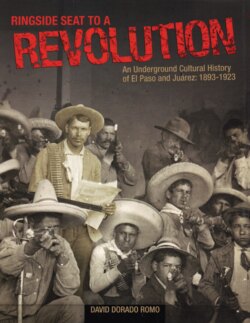Читать книгу Ringside Seat to a Revolution - David Dorado Romo - Страница 58
На сайте Литреса книга снята с продажи.
Оглавление53
“An abundant harvest was reaped in the city of
El Paso from the seed the Magón brothers sowed
in fertile fields.”
—Jesus Rangel117
ON JUNE 24, 1908, the El Paso police raided the
home of Prisciliano Silva, a veteran of the Teresista
rebellion. Silva had already served in prison for tak-
ing part in a Teresista raid on Palomas in 1896.118 The
police found several revolutionary newspapers,
Winchester rifles, six-shooters, 3,000 rounds of
ammunition, 150 homemade bombs, a large cache of
dynamite (provided by IWW miners from Arizona)
and a trunk full of letters written in secret code.119
When the code was finally broken, the police discov-
ered that the letters invariably concluded with strange
slogans, postscripts that read like they were authored
not by aging Teresistas, but dreamers of a different sort:
• The land belongs to those who work it.
• Abolish all social systems unsuitable for the
true development of the human being.
• Two hours of honorable work and the rest
for recreation.
Prisciliano Silva’s house on the corner of First
and Tays Streets, it turned out, was the center of oper-
ations for the Mexican anarchist movement. It was a
decade before the Russian Revolution, but this small
group of Mexican schemers who were found hiding
in South El Paso were trying to pull off one of the
most radical revolutions in world history.
The group feared their ideas were so “advanced”
that they should hide them even from many of their
own supporters. When they founded their movement
around the turn of the century, they called themselves
the Partido Liberal Mexicano. But by the time the PLM
moved its front lines to El Paso—from where they
attempted to launch four armed uprisings between
1906 and 1912—they had also moved ideologically
beyond liberalism. They were no longer content with
political reform or calling for the restoration of the
Liberal Constitution of 1857 as the Teresistas had a
decade before them. They did not want to substitute
a dictator for a liberal president. Now they wanted
nothing short of a full-scale anarchist revolution.
Despite this, Ricardo Flores Magón, the leader of
the Partido Liberal Mexicano, didn’t think it wise to
change their name. In 1908, he sent a coded letter
from his Arizona prison cell explaining his reasons to
his fellow anarchists hiding in El Paso:
If we had called ourselves anarchists from
the beginning, nobody would have listened
to us. Without calling ourselves anarchists
we have gone on planting in minds ideas of
hatred against the possessing class and
against the governmental caste. No liberal
party in the world has the anti-capitalist ten-
dencies like ours that is about to produce a
revolution in Mexico, and this has been
achieved without saying that we are anar-
chists. All, then, is a question of tactics.
As anarchists we know all this well. We
must give land to the people in the course of
the revolution; so that the poor will not be
deceived. There is not a single government
which can benefit the country against the
interests of the bourgeoisie. This you know
well as anarchists, and for that reason, I do
not need to demonstrate it with reasoning or
examples. We must also give the people pos-
session of the factories, mines, etc. In order
not to turn the entire nation against us, we
must follow the same tactics that we have
practiced with such success: we will contin-
ue calling ourselves liberals in the course of
the revolution but in reality we will be prop-
agating anarchy and carrying out anarchistic
acts. We must strip the property of the bour-
geoisie and restore it to the people.120
It’s not clear exactly when Ricardo Flores Magón
himself became an anarchist. Ricardo and his brother
Enrique Flores Magón had first been exposed to anar-
chism in Mexico during their youth. In the 1890s, as
law students and activists in Mexico City, they had
studied the writings of Mikhail Bakunin and Peter
Kropotkin—anarchist thinkers who advocated direct
control of the land and factories by the workers and
not by centralized states or private corporations. Later
during their exile in the U.S., the Magón brothers and
other PLM leaders established contacts with several
117
Jesus Mendez Rangel, unpublished memoir (MSS 1700, Box 4, #207), Bancroft Library, UC Berkeley.
118
Vargas, Tomóchic: La Revolución Adelantada, p. 85.
119
El Paso Herald, June 25, 1908.
120
Ricardo Flores Magón, Correspondencia (1904-1912), pp. 380-381.
